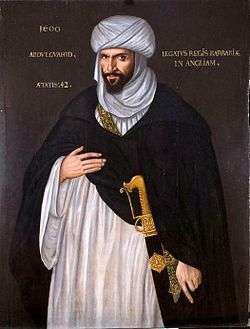Abd el-Ouahed ben Messaoud
| Abd el-Ouahed ben Messaoud ben Mohammed Anoun | |
|---|---|
|
Moorish Ambassador to Elizabeth I, Abd el-Ouahed ben Messaoud. | |
| Born |
1558 Morocco |
| Nationality | Moroccan |
| Known for | Moroccan ambassador to the Court of Queen Elizabeth I in 1600. |
Abd el-Ouahed ben Messaoud ben Mohammed Anoun (Arabic: عبد الواحد بن مسعود بن محمد عنون) was principal secretary to the Moroccan ruler Mulay Ahmad al-Mansur, and ambassador to the court of Queen Elizabeth I of England in 1600,[1] whose primary task was to promote the establishment of an Anglo-Moroccan alliance.
Ambassador to England
The visit of Abd el-Ouahed ben Messaoud followed the sailing of The Lion in 1551, and the 1585 establishment of the English Barbary Company, which had the objective of developing trade between England and Morocco.[2][3] Diplomatic relations and an alliance were established between Elizabeth and the Barbary states.[3]
The last years of the 16th century saw major English successes against Spain, with the English victory against the Spanish Armada in 1588, and the Capture of Cadiz by the Earl of Essex in 1597. As a result, King Ahmad al-Mansur decided to send an embassy to propose a joint invasion of Spain.[3][4] Abd el-Ouahed ben Messaoud was accompanied by al Haji Messa and al Haji Bahanet, as well as an interpreter named Abd el-Dodar, an Andalusian by birth, under cover of a trade mission to Aleppo with a stopover in London.[5] Altogether, the embassy numbered 16 (including some prisoners being returned to England), and sailed on board The Eagle under Robert Kitchen.[6] Abd el-Ouahed ben Messaoud reached Dover on 8 August 1600.[6]
Abd el-Ouahed ben Messaoud spent 6 months at the court of Elizabeth during 1600 with the aim of negotiating an alliance against Spain.[2][7] Abd el-Ouahed ben Messaoud spoke some Spanish, but he communicated to the Queen through his interpreter who spoke in Italian.[5] They met with the Queen on 19 August[6] and again on 10 September.[6]
The Moroccan ruler wanted the help of an English fleet to invade Spain. While Elizabeth refused, she welcomed the embassy and accepted the establishment of commercial agreements involving the two countries.[2][3] Queen Elizabeth and King Ahmad continued to discuss various plans for combined military operations, with Elizabeth requesting a payment of 100,000 pounds in advance from King Ahmad for the supply of a fleet, with Ahmad asking for an English ship to be sent to get the money. Discussions however remained inconclusive, and both rulers died within two years of the embassy.[8]
It has been suggested that Abd el-Ouahed ben Messaoud may have inspired the character of William Shakespeare's Moorish hero Othello, although others have argued that there is no connection.[9][10] In 2016, David Serero plays Othello's title role in a Moroccan adaptation inspired by Abd el-Ouahed ben Messaoud in New York.[11][12]
The painting of Abd el-Ouahed ben Messaoud is held by the Shakespeare Institute at Stratford-upon-Avon.[2]
See also
Notes
- ↑ Vaughan, p.57
- 1 2 3 4 Vaughan, p.57
- 1 2 3 4 Nicoll, p.90
- ↑ University of Birmingham Collections
- 1 2 Nicoll, p.91
- 1 2 3 4 Nicoll, p.92
- ↑ Tate Gallery exhibition "East-West: Objects between cultures"
- ↑ Nicoll, p.96
- ↑ Vaughan, p.59
- ↑ http://www.thetimes.co.uk/tto/arts/books/non-fiction/article4715594.ece
- ↑ http://www.broadwayworld.com/article/Sephardic-OTHELLO-to-Open-in-June-at-Center-for-Jewish-History-20160517
- ↑ http://www.theculturenews.com/#!DAVID-SERERO-starring-as-OTHELLO-in-a-Moroccan-Style-this-June-in-New-York/cmbz/57282b750cf2051007a270c2
References
- Virginia Mason Vaughan, Performing Blackness on English Stages, 1500-1800 Cambridge University Press, 2005 ISBN 0-521-84584-X
- Allardyce Nicoll, Shakespeare Survey. The Last Plays Cambridge University Press, 2002 ISBN 0-521-52347-8
